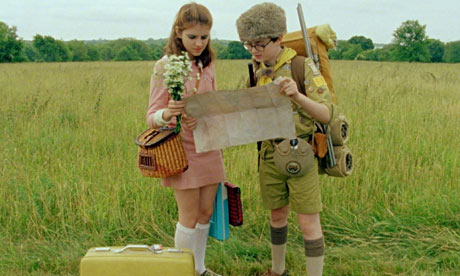
Wes Anderson's film-making style is now as singular and familiar as Japanese noh theatre, and he has been around long enough for audiences to know whether this style rubs them the wrong or the right way. For me, it is the latter, although I became disenchanted with Anderson with the release of The Darjeeling Limited in 2007, a film in which the qualities of gentleness and charm had disastrously gone missing from his habitual mannerisms: the result was self-indulgent. But his Americanised, animated version of Roald Dahl's Fantastic Mr Fox two years later was an amiable step back in the right direction, and now there is Moonrise Kingdom, another sprightly confection of oddities, attractively eccentric, witty and strangely clothed in the manner of his The Royal Tenenbaums, and like Rushmore, specifically about young people.
This is an evocation of young love in a more innocent America: a charming, beautifully wrought, if somehow depthless film; heartfelt and thought through to the tiniest, quirkiest detail in classic Anderson style. There are the familiar rectilinear shots and compositions with letters and drawings suddenly filling the screen like courtroom exhibits.
Anderson's movies often mark out their own weirdly regressive, faintly dysfunctional space, from which the modern world has been politely excluded, and whose occupants communicate in a kind of modified private language. In Moonrise Kingdom he takes us back to 1965, in a little coastal town in New England called New Penzance. Perhaps, in its quaintness, it is more truthful to the homely values of a small town America, which often looked the same in the 1960s as it did in the 50s and 40s, though this is Anderson-America in the Anderson-60s, a knight's-move away from the actual time and place.
Where David Lynch finds a dark horror beneath the wholesome exterior, Anderson sees something exotic but practical and self-possessed; a world that ticks along like an antique toy, much treasured by a precocious child. The homes and buildings often look like giant dolls' houses.
Teenage newcomers Jared Gilman and Kara Hayward play Sam and Suzy, two smart, unpopular kids who fall in love. Sam is a member of the local scout troop; an orphan, clever if not wise beyond his years, and affecting a corn-cob pipe, he resembles a young Douglas MacArthur. Suzy likes sci-fi novels and the music of Françoise Hardy, which she plays on a portable record player. She often spies on her parents and their friends using binoculars, and the movie in many ways shares her deadpan detachment.
When they run away together, Anderson shows how the ensuing crisis discloses the older generation's unhappiness. Bill Murray and Frances McDormand are Suzy's parents; their marriage is in crisis and they are sunk in anxiety and self-pity, sleeping in single beds, hardly ever meeting each other's eye and addressing each other as "counsellor", an affectionate in-joke that has calcified into something almost as formal as courtroom style. Bruce Willis is the police chief: lonely and depressed for reasons of his own, and Edward Norton is the scout troop leader, preposterous yet dignified in his absurd shorts and long socks. Grownups and kids are united in their fear and loathing of the social services officer, keen to put Sam away in an orphanage, played by Tilda Swinton in an electric-blue outfit, like an hostile insurgent from another planet.
The movie takes its odd but attractive keynote of high-mindedness from the music of Benjamin Britten. Suzy and her siblings listen to Britten's Young Persons' Guide to the Orchestra and Suzy performs in a church production of Noye's Fludde, a work whose resonance reveals itself in the movie's tempestuous final act. The music is an interesting assertion of the uncool, stolidly Anglo-Saxon character of this parochial, islanded corner of America – evoked not with conventional nostalgia, rather with a connoisseurship of how strange and different it seems. In fact, the production design of Anderson's film is, as ever, a remarkable achievement. The little kitchenette in which Willis's police chief cooks a hamfisted breakfast for Sam perfectly reflects his cramped, uncared-for loneliness.
Anderson's movies are vulnerable to the charge of being supercilious oddities, but there is elegance and formal brilliance in Moonrise Kingdom, as well as a lot of gentle, winning comedy. No one but Anderson could have contrived the scene in which the two young lovers are told to stand "over there – by the trampoline" and then we see them, waiting unself-consciously while another boy demonstrates some athletic bouncing moves on the trampoline, quite heedless of the unfolding drama. Anderson's homemade aesthetic is placed at the service of a counter-digital, almost hand-drawn cinema, and he has an extraordinary ability to conjure a distinctive universe, entire of itself. To some, Moonrise Kingdom may be nothing more than a souffle of strangeness, but it rises superbly.

